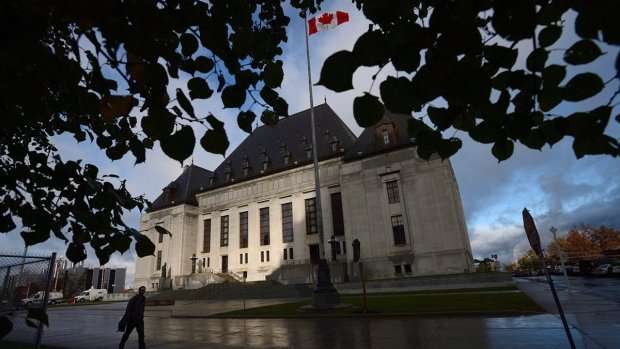OTTAWA – The federal government does not have to consult Indigenous communities when drafting new legislation, the Supreme Court of Canada has ruled, dismissing the appeal of the Mikisew Cree First Nation.
Had the ruling been in the Cree nation’s favour, it could have dramatically altered how laws are made in Canada.
The majority of the justices ruled that while Parliament needs to act “honourably” towards Indigenous people during the legislative process, there isn’t a requirement to consult before a bill is tabled.
The northern Alberta nation had taken the matter to court after the 2012 Harper-era tabling of two omnibus pieces of legislation—Bills C-38 and C-45— that changed environmental and waterway protections. The Cree nation argued that the government had a legal duty to consult them while developing the bills, in alignment with the duty to consult aspects of the treaty signed in 1899.
The First Nation said it should have been consulted on the bill because the changes it implemented impacted their treaty rights to hunt, trap, and fish on the land they traditionally held but gave up ownership of as part of the treaty.
But the government’s argument—which was supported by Canada’s top court in Thursday’s decision—was that having to apply the duty to consult during the legislative process would lead to judicial interference in the workings of Parliament.
All nine of Canada’s Supreme Court justices unanimously agreed with the previous Federal Court of Appeal ruling that stated the Court didn’t have the jurisdiction to hear the request for a judicial review, citing the separation of power between the executive and parliamentary branches of government, and the court.
Though, in a seven to two division, the justices concluded that the duty to consult is not triggered while developing legislation, though their reasons were split. From a practical standpoint, there are opportunities once a bill has been tabled to hear feedback and potentially make changes through amendments, or through a court challenge once the bill becomes law.
“In the long chain of events contributing to the development of legislation, disentangling what steps the duty to consult applies to (because they are executive) and what actions are immune (because they are parliamentary) would be an enormously difficult task,” the court ruled.
Generally the approach has, and will continue to be, that the duty to consult Indigenous groups is applied to executive decisions made by the prime minister, cabinet, or regulatory bodies when it comes to matters that could impact Indigenous treaty rights.
For example, the Federal Court of Appeal recently threw out cabinet’s approval of the Trans Mountain pipeline expansion, ordering the government to re-do parts of its constitutionally-obligated consultation with Indigenous peoples and to have the National Energy Board factor in the impacts on the increased tanker traffic that comes with the expanded pipeline.
The Mikisew Cree First Nation’s lawyer said Thursday afternoon that he was “very disappointed that the court refused to advance reconciliation with this case.” In a statement, Robert Janes said that the lack of consultations on these bills led to bad laws that are still having ramifications for Canadians.
Chief Archie Waquan called it a missed opportunity and said that First Nations should be at the table while bills are being made, and not having to react after the fact. “The Crown has said they could and would consult and we will hold them to that promise,” he said.
In a statement, Justice Minister Jody Wilson-Raybould said the decision “helps clarify how the duty to consult operates in relation to the legislative process,” and the government will now review the Court’s findings.
“Our Government remains wholly committed to respecting our Constitution and respecting and upholding Indigenous rights, and will continue to work collaboratively with Indigenous peoples on matters that directly and significantly affect them,” she said.
Reading on an app? Tap here to recap our live blog.

KingCreole8 on October 11st, 2018 at 16:42 UTC »
The way this is being reported in the media is very misleading. Because of the peculiar split between the judgments in this decision, aboriginals actually won a very substantial victory here.
Yes, it’s true that the majority of the justices agreed that the government couldn’t have its legislation struck down for simply failing to consult while developing legislation.
BUT Karakatsanis, Wagner, and Gascon held that aboriginals may sue the government for remedies flowing from the failure of the duty to consult during the legislative process. And Abella and Martin’s decision goes whole hog in favour of an expansive view of aboriginal rights to challenge legislative action.
So you’ve got five out of the nine justices endorsing remedies for failure to consult during legislation. (Karakatsanis, Wagner, and Gascon’s comments are technically obiter, but the Supreme Court almost never respects the distinction between obiter and ratio any more, and lower courts typically treat majority obiter for Supreme Court decisions with extreme deference.)
Bottom line, this is a major win for aboriginals. Don’t shoot the messenger — I think it’s a terrible result for public governance and the legitimacy of our system of government, not only in the way I’ve described but also because of the way it beefs up the concept of “honour of the Crown” — but that’s what the Supreme Court just handed us.
Noshi18 on October 11st, 2018 at 14:08 UTC »
No one group should hold special powers so this is the right decision.
ONE-OF-THREE on October 11st, 2018 at 13:52 UTC »